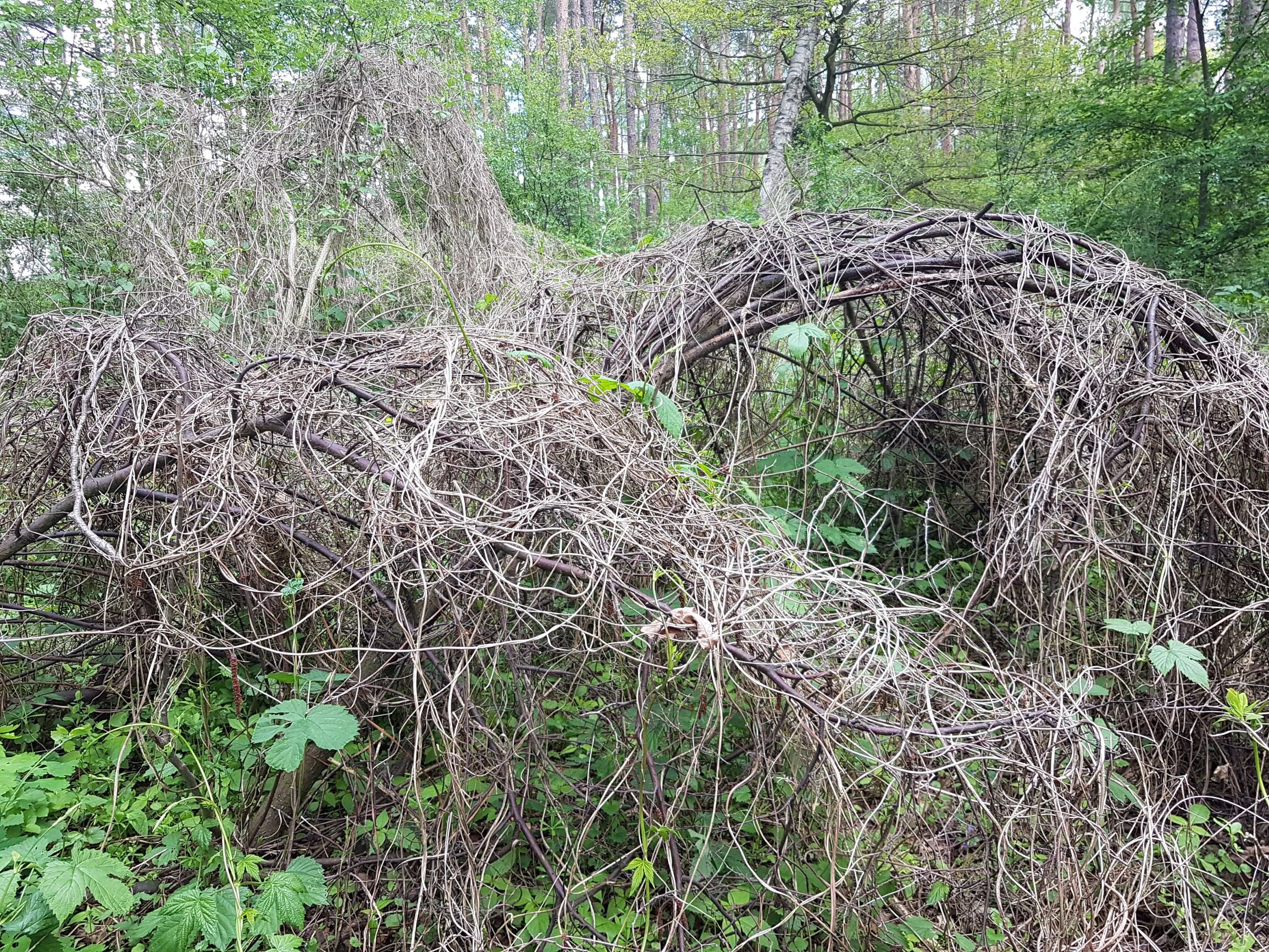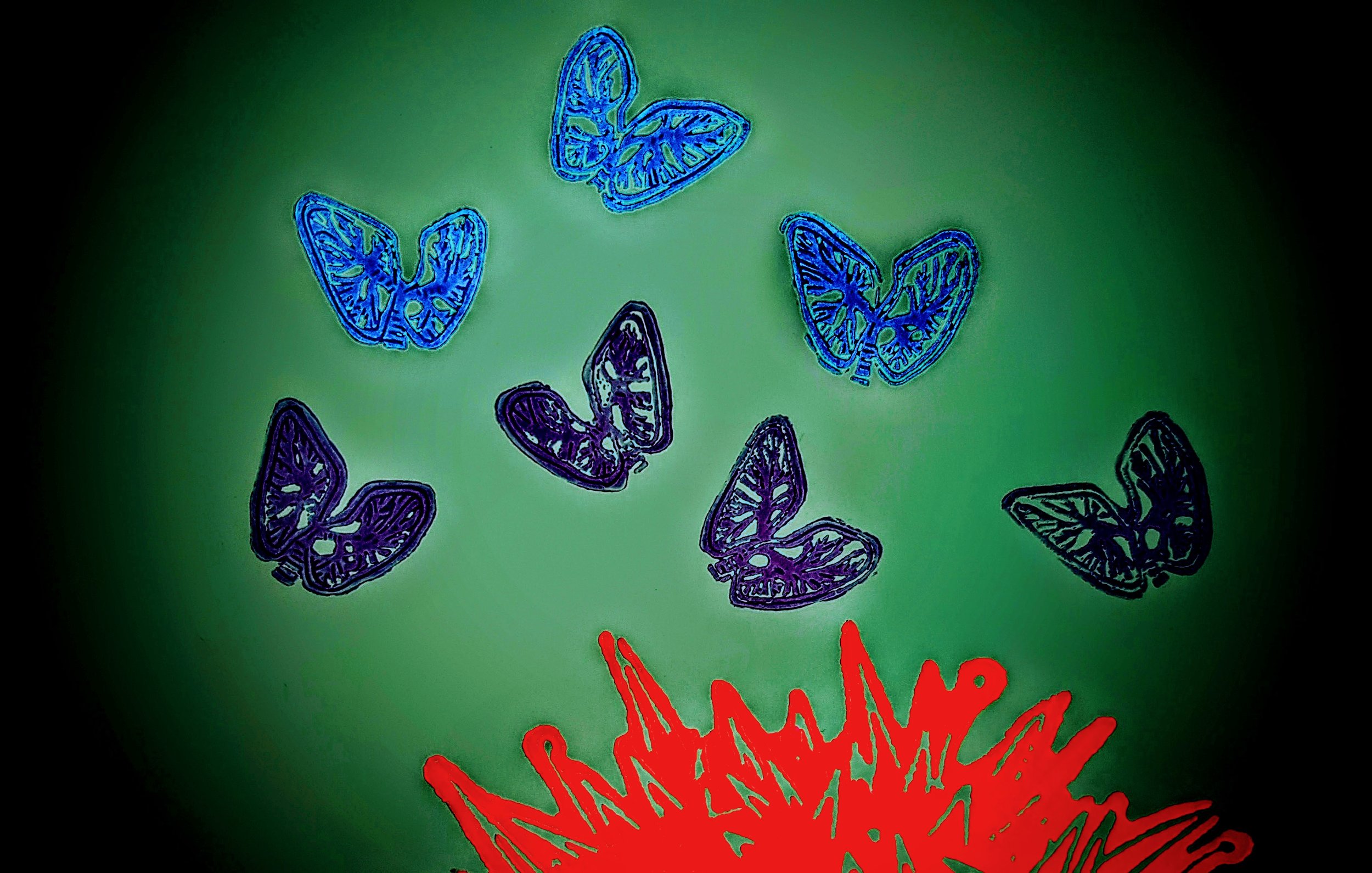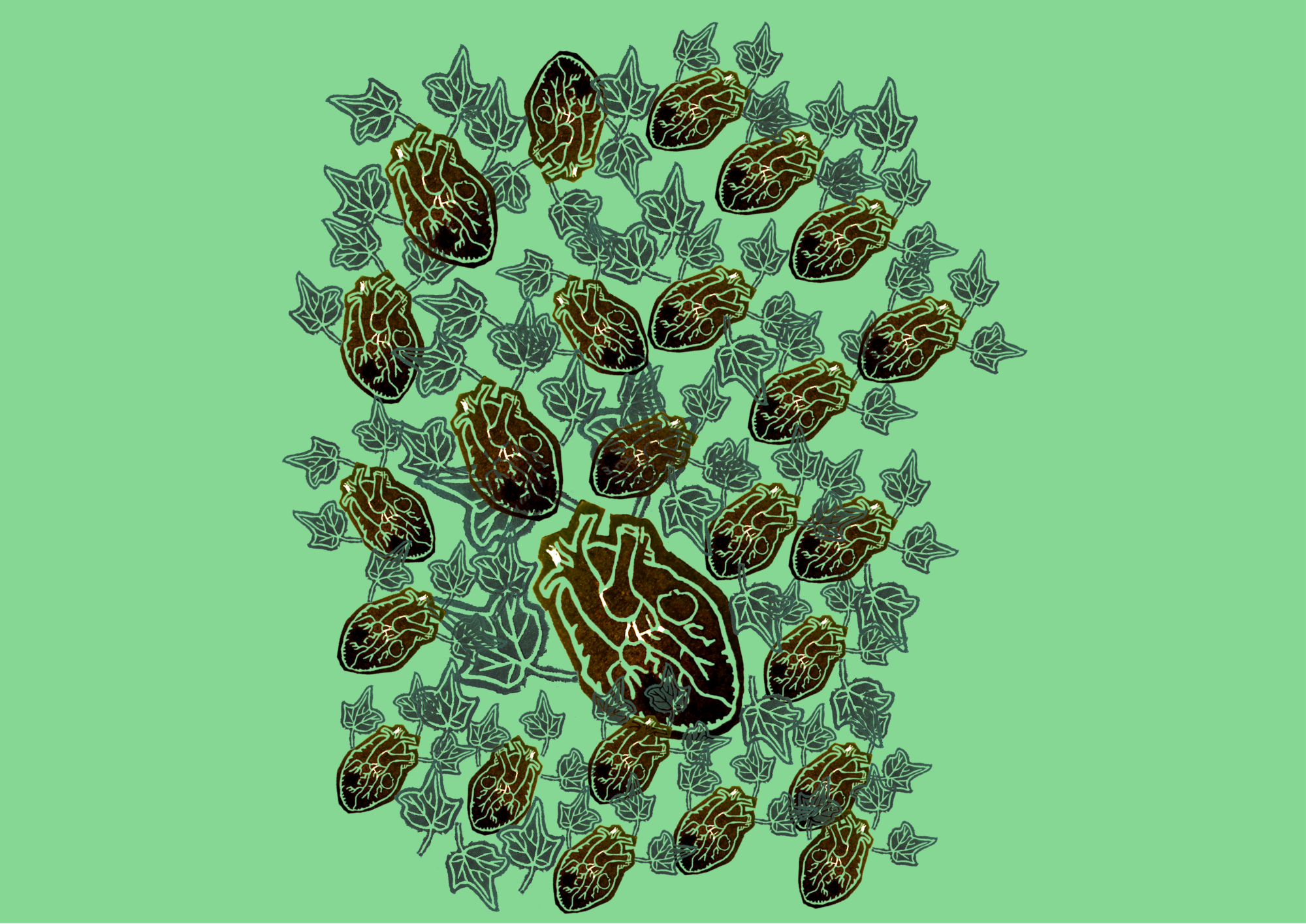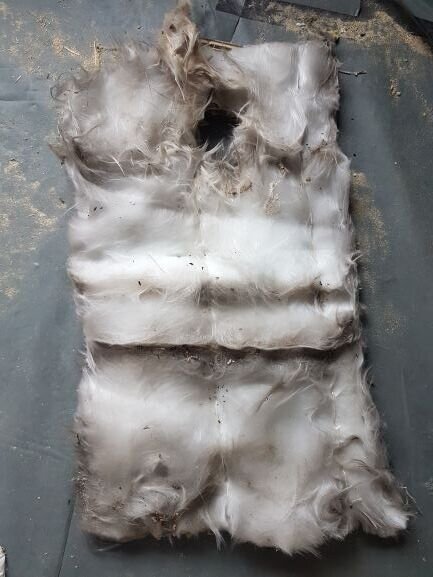Anecdotal Observatory
The Mark

Butterflies
When the season was right, Hanneke studied butterflies, but the season wasn’t right, and she felt lonely. In her dreams, she observed butterflies, drew them. She’d spent the morning testing the spring ice on the forest lakes, thinking she could fill her time with ice skating. But the ice was too thin. Today was Saturday though, and the ice disco up in Herrischried would be open. In the afternoon she drove up through the descending dark to the skate rink. The ice oscillated in pink and purple from the colored projectors. She nodded at village acquaintances, who whispered to each other as she skated by. On skates she was a bumble bee moving gracefully in defiance of what others thought possible of her. She’d been called too big all her life, and it had made her feel small. They called her a freak behind her back, the ogre. She knew that.Until recently, she’d lived with her sickly mother. Now, she lived alone—still in the family’s old water mill in the Black Forest by the white creek that ran down from the mountainous heart of the forest. After her mother was gone, Hanneke continued as before. She felt at ease in the woods—never felt too big or too small there.After some rounds skating through 90s euro-dance, she went to get herself a Rothaus.A slight man was drinking a fragrant winter punch at the bar. Berries and cinnamon. She mumbled hello.‘Hello,’ he smiled.A short pause, then she asked, ‘Are you new here?’‘Just visiting. Hiking through the Black Forest and happened to pass by this place.’ He gestured at the skate rink. ‘It looked magical. Had to come closer and see.’It turned out he was planning to sleep in the forest. Hanneke thought that crazy, the nights still being cold, and invited him to stay at her place. Big and empty as it was. When he picked up his bag to walk to Hanneke’s car, she noticed it wasn’t a backpack but an old leather suitcase.‘It was my father's,’ he said, and she nodded.They agreed he’d stay for a few days. But he lingered: days turned into weeks. She went about as usual, while he seemed to sleep all day and only joined her in the evenings. She had missed sharing the house with the quiet presence of another.They went for walks. Cooked together. He had a large appetite for greens. He loved fennel and parsley so much that she came to love it too.One weekend morning, Hanneke knocked on his door, wanting to suggest they go for a daytime walk together, opened it and froze: he wasn’t there. Instead, a giant caterpillar lay on the bed, green with black and orange markings, seemingly sleeping. A nervous laugh escaped her. Her eyes searched the room for an explanation. On the floor, the leather suitcase lay open with the skin of the man inside, neatly folded. Heart racing, she stepped out backwards through the door and closed it. Agitated, but not afraid, she sat down by the window overlooking the creek and waited. In the evening, he came out and sat down across from her in his man skin again. ‘What are you?’ She looked at him.‘I wanted to tell you, but...’ He looked at his feet. ‘I am about to change. Then I’llleave—summer is around the corner.’Two weeks he stayed in his room, and she didn’t dare to disturb. When he finallycame out, he kissed her. Hanneke had never wanted to kiss any man, but there was an intensity to his touch that made a suppressed instinct surface. She took the lead.In the morning he was already gone. He’d forgotten his suitcase. She ignored its presence under the bed.Then butterfly season came, and time went by easily. June, July, August.One September day, she opened her door and saw a great butterfly at her doorstep. He was weak. She let him crawl in to rest by the wood burner. His breath was slow. She remembered the suitcase and got it for him—maybe he needed to change into a warmer skin?But by nightfall he’d stopped breathing. She stood for a moment, then picked her beautiful friend up, light as air, carried him outside, and let him float down the creek. Said thank you into the forest. And felt something, like a flutter in her belly. ▣
Work
I want to make a picture that I’ve had
in my mind
for some time.
It looks something like this: it is
a picture of
a figure with
extremely pale hands
and a very white beard
that’s wavy in a funny sort of way
and it has a skeletal face in a way.
Or maybe the figure just is
really pale ---
what I'm drawing is
what I'm cutting away
what I'm cutting away
will be the colour of
the paper. The idea
that you have
has to
be worked
out through
the material.
(English subtitles to YouTube video about the artist Tal R making a woodcut. Line breaks added)
Woolly Piggy
The woolly piggy (one) stood in the mud as the wuthering pigeons (too many) took off. It was cold. Where did they go? Don’t know. The woolly piggy stayed. Schorfheide/Berlin, January 2022.
▣
List of Things I’d Like to Say to Ivy
1. You seem to be everywhere I look, Ivy. The closer to the edge of Berlin I come, the more of you there is, Ivy. On the cherry tree in the deep east of Brandenburg, in the small garden with the old barn we bought. Growing on endless Soviet and World War I memorials. And on the churchyards of course. And all over the old mill that I passed in the wolf woods; a massive structure of ivy stretching up and out of the valley, blooming in December, only the mill’s steadily rotating wheel visible.
2. The above made me wish I were more like you, Ivy. Because you’re not like the prickly, stout juniper shrubbery smelling of spicy fox piss that surrounds the Seelower memorial honoring the “liberation” of Germany by the Soviet army. And you’re not like the pretty grapevine that has surrendered to the autumn too soon, too apathetic, painting a red trail along Berlin train tracks all the way to Wannsee and back.
3. You’re more like getting off that train, Ivy, and following google maps — climbing up, down, left, right — to find an audio guide to the acoustic memorial of Heinrich von Kleist and instead finding myself in a camp of homeless people under the bridge between Großer and Kleiner Wannsee. Green sleeping bags tugged in between the top of the grey pillars and the road’s flipside, like truthful garlands.
4. And at the actual memorial (a tombstone surely installed by Herr von Kleist’s ghost himself, mostly grieving for the living) you’re a crisp, leafy poison in the air above the Havel river. And the river, the color of baby Yoda’s eyes, laps against the banks heavy with cold while an elderly behatted lady trims your growth around the stone, and a strange streamable voice in my ears only shouts:
Wo geh ich her? Wo geh ich hin?
Und wenn du das nicht weißt, wohlan:
Wo bin ich? sag mir an, das wirst du wissen;
In welcher Gegend hier befind ich mich?“
And the Alraun, the witch — or is it you, Ivy? — answers:
Zwei Schritt vom Grab, Quintilius Varus,
Hart zwischen Nichts und Nichts! Gehab dich wohl!
At least I’m between the nothings, I thought. But to be certain I took my family and left the city, while we could, to feel closer to living things growing out of the dirt.
5. And oh Ivy, the sky-scraping cherry tree is covered in you, in the garden we bought. A sight for sore city eyes, wild enough to fall in love with. But now that I am the caretaker of the tree, I am unsure that it will survive you. Is it true or is it just a myth: that you kill? I do want to do the right thing, but I’m in a Funkloch and have not yet installed Wi-Fi, so there’s no way of knowing; I tear you off the tree. Hack and hack your roots. With a spade, it’s fun while listening to Taylor Swift, setting free the blond scars of the tree’s skin. It’s a way to deal with love, if I understood the song correctly: a kind of ivy?
6. I hacked on, not successful in killing your roots, while the kids pulled down the grapevine from the old stone walls in one morning: The morning of the freedom of the stones, I thought. But the stones looked old and like something was missing. The vine was easy to get rid of, but Ivy, you were like: Thick jelly, poison stalactites from a hairy misplaced root, like the legs of a mythologized spider, hanging from a tree. But protruding from the ground, little green leaves nourished by the hidden mother of roots. Not like the start of nothing. More like a trinity of growth, death, love: destruction at its best. Like you, Ivy. It made me want to be more like you.
▣
Afternoons (1) — Skinning a House
In our family, life only catches speed in the afternoon. And so, it was on a spring afternoon in our new, though very old, weekend-shed in Brandenburg that Ivo, our 6-year-old son, started barking at the neighbors (whose dogs barked at us), and I decided that we’d need a proper fence——something to mark our territory and set everyone at ease. And it was on the same afternoon that the kitchen door kept squeaking open. It slid open, again and again, and it was clear that it wasn’t the wind; no wind capable of opening a door ever moved that slow. ——And whoever was in the kitchen at that particular time would turn and look at the door to greet the stranger that had entered, but would see no one there. Riad, who had decided to quickly fix the problem, ended up spending a good part of three weekends cursing locks and doorknobs. The door resisted fixing.
And the dogs——did they bark at us because we were strangers, or because they thought we were the previous, unloved, owners who’d come back? As we overcame our big-city suspicion of Brandenburg locals and made an effort to strike up a friendly rapport with their (German-flag-curtains) human, it certainly helped. On one afternoon, she brought us eggs from their chickens (brown, white, green) and we returned the favor with homemade (cloudy yellow) elderflower syrup. In a village, people need each other, she said and winked.
On another afternoon, we arrived to spend the weekend, after the house had been closed up for two weeks and found a small bird dead in the corner of a room. How it had gotten there was a mystery, seeing that the door to the room was closed as was the single, tiny window.
The previous autumn, we had been hunting houses for a while and were moderately happy to spot this one within our range. The house was old and we moved quickly, but soon realized that houses with long, hard lives behind them have a way of fighting back from the beyond. The house might have been dead, but the break-down process was alive. At first, we thought our job was to try and roll back the decay, but rather we were arranging this body to fit us, changing the direction of the process, extending it to gain time for ourselves, and thereby becoming part of it.
I suppose the haunted houses of ghost stories, like most fiction, are based on real-life experience. Like the experience of how the older a house gets, the more of an independent organism it becomes——always hosting and supporting other beings, most of them hidden; swallows, bats, mice, rats, memories, ghosts, martens——and how it rests in a delicate equilibrium, implying that one can’t, for example, simply buy a new lock for the kitchen door and expect it to work just because the measures are right. And as you modify walls, windows, and rooms to your needs the house might begin to change you a little too.
From October to May, on many weekend afternoons, we removed glass wool, drenched in all sorts of marten excrements. The marten had made a nest there. It couldn’t have been for just one season, judging by the number of bones and fish heads buried in the insulation, birth blood, the wooden beams rotting in ammonium humidity. Little by little, we fished out the ragged synthetic fur from between the walls and under the roof, and dried-up little turds rained down on us.
We meant well to strip the house of its creepy glass wool and marten shit, but we were slow and in winter it stood there stone-cold as the temperature dropped. As we removed the layers of dirt, we began to fear that there was something wrong with the house underneath. Something had been eating at the roof beams. Symptoms had been patched over, causes not addressed. The old owners had mentioned the option of calling the local handyman, living three doors down the main (and only) street in an impressive yellow half-timbered house, but warned us that he held Nazi sympathies, and so we shouldn’t discuss politics with him. That, to us, felt like the wrong way to go about it. Also, it didn’t seem that he had done a very good job fixing things around the house.
Some things are hard to get rid of and it has to be done with empathy and firm intent——like with the case of a marten. Others are more than hard to get rid of and overwhelming to deal with face to face, like Nazis. So I focused on martens and ghosts and went about in frightened denial regarding the Nazi down the road. ——Until we heard that he’d had to move to take care of his elderly mother, that is. It sounded surprisingly human. Whatever that means. In any case, maybe we should have called him and consequently made up our own opinion?
Through those afternoons at the house, we were rearranging its bones, inserting a new insulating membrane, planting a seedling in the community by giving and receiving gifts and favors; hoping that the house would wake up to yet another life. That the village eco-system would accept this new limb that had decided to grow there——sometimes, to get out of the city.
On the third spring weekend, the door was fixed and both the dogs and Ivo had stopped barking. Sunlight and the buzzing of insects descended on us, and as the heat waves started rolling in we were grateful that the old bones of the house seemed utterly resistant to warmth.
▣
Mark (noun, English): a small area on the surface of something that is damaged, dirty, or different in some way.
Mark (noun, German): Limit, Borderland, March (as in soldiers marching).
Mark Brandenburg (geographical name, German): A historical landscape in nowadays eastern Germany and western Poland. Colloquially the current German federal state of Brandenburg is sometimes called the Mark or Mark Brandenburg, but the Mark no longer exists as such.
Danmark (geographical name, Danish): Flatlanders’ borderland.
Observatory (noun): 1) a building or location used for observing terrestrial, marine, or celestial events. Also, an institution whose primary purpose is making such observations. 2) a situation or structure commanding a wide view.
Anecdotal (adj.): 1) based on or consisting of reports or observations of usually unscientific observers. 2) of, relating to, or consisting of anecdotes. / Anecdote (noun): Apparently origins from the Greek a-, meaning not, and ekdidonai meaning to publish. I.e. unpublished. Most definitions of the word anecdote emphasize that it is a short revealing narrative, focusing on a person or an incident——often amusing, but not necessarily.








